Exploring the Efficacy of Ayurvedic Medicines for Diabetes Management
Last updated on : 13 May, 2025
Read time : 36 min
Ayurvedic medicines offer a natural approach to managing diabetes, focusing on balancing the body’s energy and improving overall health. These remedies, derived from herbs and natural ingredients, have been used for centuries to help regulate blood sugar levels and enhance insulin sensitivity. Exploring the efficacy of Ayurvedic medicines for diabetes management can provide valuable insights into alternative treatments that complement modern medicine, offering a holistic approach to better health and well-being.
Understanding Diabetes
Diabetes is a chronic medical condition characterized by high levels of glucose (sugar) in the blood. It occurs when the body either doesn’t produce enough insulin (Type 1) or becomes resistant to insulin’s effects (Type 2). Insulin is a hormone that regulates blood sugar levels and helps convert glucose into energy. Without proper insulin function, sugar builds up in the bloodstream, leading to potential complications such as heart disease, kidney problems, and nerve damage. Managing diabetes requires careful monitoring of blood sugar levels, a balanced diet, regular exercise, and often medication to maintain healthy glucose levels.
Challenges of Living with Diabetes
Living with diabetes can be challenging as it requires constant blood sugar monitoring, dietary restrictions, and the risk of complications like nerve damage and cardiovascular issues. Emotional stress, managing medication, and potential lifestyle adjustments also add to the complexity of daily diabetes management.
Ayurvedic Approach to Diabetes Management
Ayurveda focuses on holistic management of diabetes through diet, lifestyle changes, and herbal remedies. Key approaches include balancing doshas, incorporating herbs like bitter gourd and fenugreek, and promoting physical activity. These methods aim to naturally regulate blood sugar levels and improve overall well-being.
Read more: Benefits of Ayurvedic Medicines
Effective Ayurvedic Medicines for Managing Diabetes
Ayurveda provides a natural and holistic approach to managing diabetes, emphasizing the balance of body energies and overall well-being. Below are some of the most effective Ayurvedic medicines for diabetes that can help to regulate blood sugar levels.
| Sr. No. | Product name | Brand |
| 1 | Bgr 34 Tablet 100 | Aimil Pharmaceutical |
| 2 | Himalaya Diabecon Ds Tablet 60 | Himalaya Drug Company |
| 3 | Amree Plus Tablet 60 | Aimil Pharmaceutical |
| 4 | Patanjali Divya Madhunashini Vati Extra Power Tablet 120 | Patanjali Ayurved Ltd |
| 5 | Myupchar Ayurveda Madhurodh Juice 1000ml | Doctorvahini Private Limited |
| 6 | Maharishi Ayurveda Glucomap Tablet | Maharishi Ayurveda Products Private Limited |
| 7 | Prohance D Diabetes Care Vanilla Flavour Powder | Ranbaxy Laboratories Ltd |
| 8 | Ensure Diabetes Care Powder Vanilla Flavour | Abbott Healthcare Pvt. Ltd |
| 9 | Celevida Kesar Elaichi Flavour Sugar-Free Powder | Dr. Reddys Laboratories Ltd |
| 10 | Horlicks Diabetes Plus Vanilla | Hindustan Unilever Ltd |
| 11 | Protinex Diabetes Care Creamy Vanilla Flavour Powder | Nutricia International Pvt Ltd |
| 12 | Pentasure DM Diabetes Care Vanilla Flavour Sucrose Free Powder | Hexagon Nutrition Pvt. Ltd |
1. Bgr 34 Tablet 100
BGR-34 Tablet is formulated to assist individuals in managing their blood sugar levels effectively. While it is not a cure for diabetes, it serves as a supportive aid to promote overall health and well-being.
How to Use:
- Take two BGR-34 Tablets twice daily, ideally 30 minutes before meals.
2. Himalaya Diabecon Ds Tablet 60
Himalaya Diabecon DS Tablet is designed to help maintain healthy blood sugar levels. Its unique formulation aids in protecting pancreatic beta cells while supporting overall pancreatic health.
How to Use:
- Take as recommended by your physician or healthcare provider.
3. Amree Plus Tablet 60
Amree Plus Tablet is an Ayurvedic formulation designed to help manage high blood glucose levels and associated symptoms. It works by supporting healthy carbohydrate metabolism, promoting efficient energy production and utilisation, and making it beneficial for individuals with diabetes or those at risk of developing it.
How to Use:
- Take 2 tablets twice daily, preferably 30 minutes before meals, or as advised by your healthcare professional.
4. Patanjali Divya Madhunashini Vati Extra Power Tablet 120
Patanjali Divya Madhunashini Vati Extra Power Tablet helps manage blood sugar levels while offering a range of health benefits. Crafted with a blend of potent natural ingredients, this formulation supports overall well-being through its synergistic medicinal properties.
How to Use:
- Take 1–2 tablets twice daily on an empty stomach with water, or as advised by your physician.
5. Myupchar Ayurveda Madhurodh Juice 1000ml
Myupchar Madhurodh Karela Jamun Juice supports healthy blood glucose levels and aids in promoting digestive well-being. It is enriched with the natural goodness of Karela (bitter gourd), Jamun, and other powerful Ayurvedic herbs.
How to Use:
- Mix 30 ml of Madhurodh Karela Jamun Juice with an equal quantity of water.
- Consume twice daily, ideally 30 minutes before meals.
- For optimal results, take it on an empty stomach in the morning and continue the regimen for eight weeks.
6. Maharishi Ayurveda Glucomap Tablet
Maharishi Ayurveda Glucomap Tablet is a natural Ayurvedic solution designed to help manage blood sugar levels effectively. The blend contains powerful herbs known for their ability to regulate insulin secretion and maintain metabolic balance. By promoting holistic wellness, it addresses the root causes of blood sugar imbalances. Customers prefer this tablet for its lack of side effects, noticeable improvements in energy levels, and its ability to enhance overall well-being, making it a trusted choice in diabetes care.
7. Prohance D Diabetes Care Vanilla Flavour Powder
Prohance D is a scientifically advanced nutritional supplement tailored for individuals with diabetes. Packed with high-quality proteins, vitamins, and minerals, it offers balanced nutrition while managing blood sugar levels. Its low glycemic index ensures minimal sugar spikes, making it suitable for everyday consumption. The creamy vanilla flavour enhances its appeal, and customers commend it for its ability to deliver sustained energy throughout the day while supporting overall health.
8. Ensure Diabetes Care Powder Vanilla Flavour
Ensure Diabetes Care Powder is a premium nutritional formula designed for those managing diabetes. It features a low glycemic index and a rich nutritional profile, including proteins and essential vitamins, to prevent blood sugar spikes while meeting daily dietary needs. Customers trust the Ensure brand for its quality and effectiveness. They enjoy the delicious vanilla flavour and appreciate how it keeps them energised and satiated for hours.
9. Celevida Kesar Elaichi Flavour Sugar-Free Powder
Celevida is a sugar-free nutritional supplement specifically designed for diabetes management. The delightful kesar elaichi flavour adds an aromatic twist to its rich nutritional blend, which helps regulate blood sugar levels and provides essential nutrients. Customers love its dual benefits of enhancing taste and supporting energy control. Many have reported reduced hunger pangs and better overall blood sugar management, making it a staple in their diabetes care routine.
How to Use:
- Mix 2 scoops (25g) of powder in 200ml of lukewarm water or milk.
10. Horlicks Diabetes Plus Vanilla
Horlicks Diabetes Plus is a specialised health drink formulated to cater to the dietary requirements of people with diabetes. Its low glycemic index ensures steady glucose levels, while its blend of proteins, vitamins, and minerals supports overall health. The smooth vanilla flavour adds a comforting touch, and customers appreciate its established brand reputation. Many choose it for its ability to deliver long-lasting energy and aid in better diabetes management.
How to Use:
- Mix 2-3 scoops (approximately 50g) of powder in 200ml of lukewarm water or milk.
11. Protinex Diabetes Care Creamy Vanilla Flavour Powder
Protinex Diabetes Care is a high-protein nutritional supplement designed to complement the dietary needs of diabetics. It supports muscle health, manages blood sugar levels effectively, and promotes a healthy lifestyle. The creamy vanilla flavour is a customer favorite, adding indulgence to their daily nutrition. Customers appreciate its nutritional value and its ability to keep them full and energised, contributing to improved overall health.
How to Use:
- Mix 2-3 scoops (approximately 50g) of powder in 200ml of lukewarm water or milk.
12. Pentasure DM Diabetes Care Vanilla Flavour Sucrose-Free Powder
Prohance D is a scientifically advanced nutritional supplement tailored for individuals with diabetes. Packed with high-quality proteins, vitamins, and minerals, it offers balanced nutrition while managing blood sugar levels. Its low glycemic index ensures minimal sugar spikes, making it suitable for everyday consumption. The creamy vanilla flavour enhances its appeal, and customers commend it for its ability to deliver sustained energy throughout the day while supporting overall health.
How to Use:
- Mix 1-2 scoops (approximately 50g) of powder in 200ml of water or milk.
Top Ayurvedic Herbs for Managing Diabetes
Let’s look at the top Ayurvedic herbs one by one mentioned in the literature:
Turmeric

- This golden spice contains curcumin, which has anti-inflammatory and antioxidant properties. It helps reduce insulin resistance, promotes healthy blood sugar levels, and supports overall health.
- Turmeric cleanses the blood and enhances the body’s ability to use insulin effectively. It helps glucose enter the cells, improving insulin sensitivity.
Read more: Other Benefits of Turmeric
Tulsi

- Tulsi (holy basil) is a potent herb that helps lower blood sugar levels, improves insulin secretion, and reduces stress. It also has antioxidant and anti-inflammatory properties.
- Every part of the tulsi plant, including its leaves, stems, seeds, and oil, has medicinal properties. It benefits people with diabetes, whether type 1 or type 2, as it can help lower blood sugar levels.
Read more: Other Benefits of Tulsi
Giloy
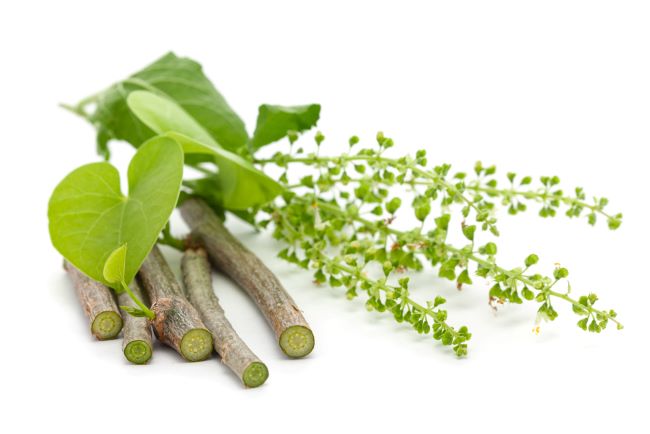
- Known for its immune-boosting properties, Giloy helps regulate blood sugar levels and supports pancreatic health, making it beneficial for individuals with diabetes.
- As a natural anti-diabetic herb, Giloy helps suppress sugar cravings, reducing the desire for unhealthy sugary foods.
Read more: Giloy Juice Benefits
Triphala
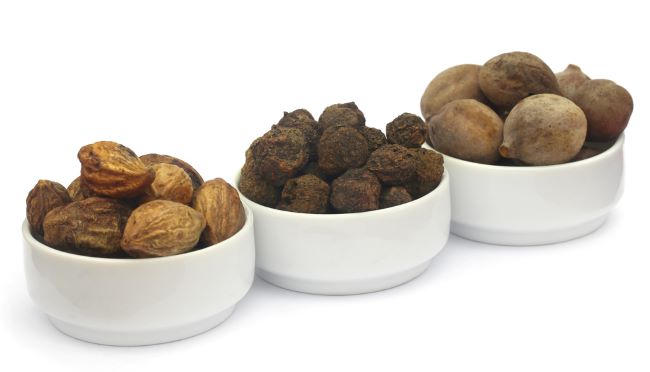
- A combination of three fruits (Haritaki, Alma, and Bibhitaki), Triphala aids digestion, improves metabolism, and helps maintain healthy blood sugar levels. It also supports detoxification and overall well-being.
- Triphala works by suppressing glycation enzymes, which are involved in the development of diabetes.
Fenugreek Seeds
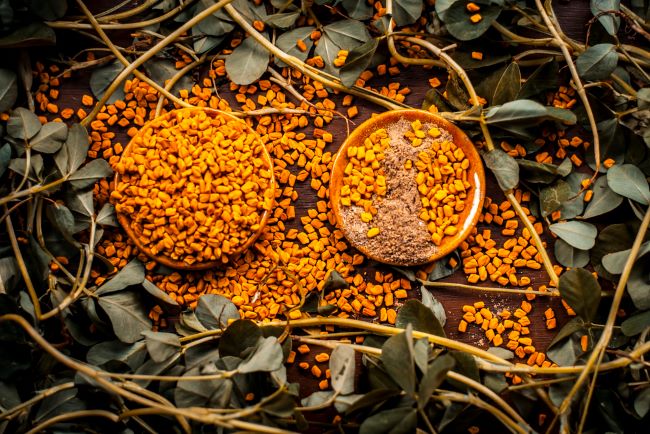
- Fenugreek seeds are rich in soluble fibre and have been used in Ayurveda to manage diabetes. Fenugreek seeds help improve insulin sensitivity, lower blood sugar levels and support healthy cholesterol levels.
- These seeds can be conveniently procured without the burden of high costs.
Read more: Other Benefits of Fenugreek Seeds
Cinnamon

- This aromatic spice can improve insulin sensitivity and lower fasting blood sugar levels. It can be added to meals or consumed as tea.
- A daily dose of two to three grams is recommended for a person with diabetes for effective management.
Read more: Other Benefits of Cinnamon
Drumsticks
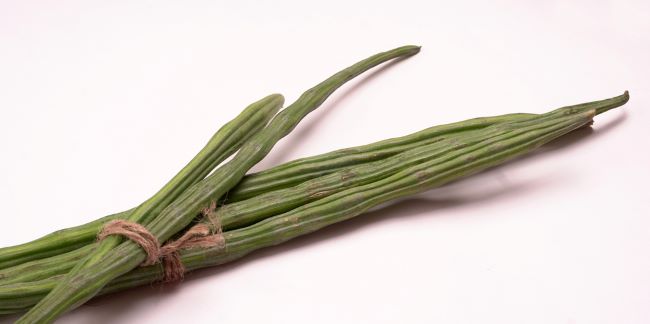
- Drumsticks, or Moringa oleifera, have been used for centuries in traditional medicine for various health benefits.
- The leaves and pods of drumsticks possess anti-diabetic properties. They help lower blood sugar levels, enhance insulin secretion, and promote healthy glucose metabolism.
Read more: Drumsticks health benefits
Vijaysar
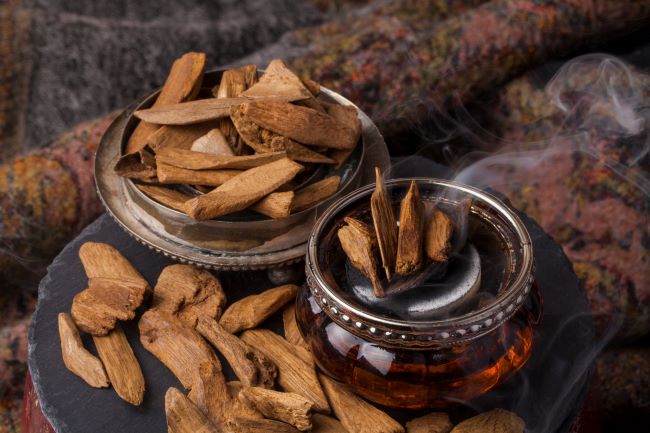
- The management of diabetes can be achieved by using Vijaysar powder, owing to its impressive antioxidant and anti-inflammatory properties.
- This natural remedy effectively protects pancreatic cells against free radicals’ destructive effects while promoting insulin secretion.
Gurmar

- Research suggests that Gurmar may be beneficial in treating type 2 diabetes. It is due to its antioxidant and anti-inflammatory properties, which may help to protect pancreatic cells from damage caused by free radicals.
- Additionally, Gurmar may increase insulin secretion, which can help to lower blood sugar levels. Incorporating Gurmar along with a balanced diet as per a diabetes diet chart can enhance diabetes management.
Sadabahar

- According to research findings, the Sadabahar (periwinkle) plant has been linked to a potential anti-diabetic effect. It can stimulate insulin secretion from beta cells in the pancreas.
- It suggests that the leaves of the Sadabahar plant could potentially assist in managing diabetes.
Neem

- Neem is beneficial for managing type-2 diabetes as it helps improve how the body uses insulin and glucose in the muscles.
- It can help regulate blood sugar and enhance the body’s response to insulin, essential for individuals with diabetes.
Amla

- Amla (Indian gooseberry) has been found to improve insulin sensitivity, thus allowing the body to use insulin more effectively. It can be beneficial for individuals with type 2 diabetes.
- It is known for its hypoglycemic properties, which help lower blood sugar levels. Consuming amla can assist in managing diabetes effectively.
Read Also: Amla Juice for diabetes
Diabetes, according to Ayurveda
According to the principles of Ayurveda, there is a strong correlation between imbalances in the three doshas – Vata, Pitta, and Kapha – and the development of diabetes.
Read more: Benefits of the Ayurveda diet
An imbalance in Vata can negatively impact the functioning of the pancreas, while an imbalance in pitta can lead to issues with metabolism. Finally, an imbalance in Kapha can affect insulin resistance, a critical factor in the onset of diabetes.
To effectively manage diabetes, it is essential to thoroughly understand one’s body constitution or Prakriti, according to Ayurveda. This personalised knowledge can help tailor treatment methods and dietary suggestions that cater to the individual’s unique needs.
Ayurvedic treatment for diabetes includes herbs such as neem, gurmar, turmeric, and cinnamon. These herbs possess unique properties that aid in stabilising blood sugar levels and enhancing insulin sensitivity.
Ayurvedic Classification of Diabetes (Prameha)
Ayurveda, the ancient Indian system of medicine, recognizes diabetes as a complex disorder known as Prameha. Prameha is a broad term encompassing various types of diabetes and urinary disorders, classified into 20 subtypes based on specific symptoms and the involvement of the three doshas: Vata, Pitta, and Kapha. Understanding these subtypes helps in the precise diagnosis and personalized treatment of diabetes.
Vataj Prameha (4 Types)
Vataj Prameha is caused by an imbalance in the Vata dosha, leading to dryness and depletion in the body.
- Kshoudrameha: Urine is honey-like, sweet, and sticky.
- Ikshumeha: Urine resembles sugarcane juice in taste and appearance.
- Sandrameha: Urine is thick and dense.
- Shanirmeha: Urine is thin and clear, resembling water.
Symptoms: Insatiable thirst, frequent urination, unintended weight loss, dryness in the mouth and skin.
Ayurvedic Treatment
- Herbal remedies like Triphala, Guduchi, and Guggulu.
- Dietary adjustments to balance Vata, including warm, moist, and easily digestible foods.
- Regular oil massages (Abhyanga) and stress reduction techniques like meditation and yoga.
Pittaj Prameha (6 Types)
Pittaj Prameha results from an excess of Pitta dosha, leading to inflammation and heat in the body.
- Ksharameha: Urine is alkaline in nature.
- Kalameha: Urine is dark in color.
- Nilameha: Urine is blueish or greenish.
- Raktameha: Urine is mixed with blood.
- Haridrameha: Urine is yellowish.
- Manjisthameha: Urine resembles the color of Manjistha (a red herb).
Symptoms: Insatiable hunger and thirst, excessive sweating, persistent burning sensation, yellowish urine.
Ayurvedic Treatment
- Cooling and detoxifying herbs like Neem, Amalaki, and Aloe Vera.
- Dietary changes to pacify Pitta, including cooling foods like cucumbers, melons, and leafy greens.
- Avoidance of spicy, oily, and fermented foods.
Kaphaj Prameha (10 Types)
Kaphaj Prameha is due to an excess of Kapha dosha, leading to heaviness and stagnation in the body.
- Udakameha: Urine is watery.
- Ikshumeha: Urine is sweet like sugarcane juice.
- Sandrameha: Urine is thick and dense.
- Shaudrameha: Urine is frothy.
- Sita Meha: Urine is cold to touch.
- Shuklameha: Urine is white and turbid.
- Shitalameha: Urine is cool and clear.
- Lalasameha: Urine is mixed with mucus.
- Meda Meha: Urine is oily.
- Picchameha: Urine is slimy and viscous.
Symptoms: Cloudy urine, excessive weight gain, lethargy, sweet taste in the mouth, excess mucus production.
Ayurvedic Treatment
- Herbs like Guggulu, Haritaki, and Trikatu to reduce Kapha.
- A Kapha-pacifying diet, including light, dry, and warm foods like barley, millet, and vegetables.
- Regular exercise and avoidance of dairy products, sweets, and cold foods.
Avarana Prameha
Avarana Prameha is a complex form of diabetes caused by the obstruction of vital channels in the body, preventing the proper distribution of nutrients and leading to severe complications.
Symptoms: Symptoms vary widely but can include severe fatigue, complications in multiple organs, and persistent high blood sugar levels.
Ayurvedic Treatment
- Comprehensive detoxification procedures like Panchakarma to clear the obstructions.
- Use of potent herbs like Guggulu, Shilajit, and Punarnava.
- A holistic approach combining dietary management, lifestyle changes, and regular physical activity.
Madhumeha: A Specific Type
Madhumeha is a specific type of Prameha in Ayurveda, characterized by the presence of excessive sweetness in the urine, which aligns closely with modern-day diabetes mellitus. This condition results from an imbalance in the body’s doshas, primarily affecting the Vata dosha, leading to symptoms such as frequent urination, intense thirst, and weight loss. Ayurvedic treatment for Madhumeha focuses on balancing the doshas through dietary changes, herbal remedies like Gudmar and Jamun, and lifestyle modifications including regular exercise and stress management techniques. This holistic approach aims to manage blood sugar levels and improve overall health.
Ayurvedic Principles for Diabetes Management
Ayurveda, the ancient Indian system of medicine, offers a holistic approach to managing diabetes through a combination of dietary practices, herbal remedies, and lifestyle modifications. Central to Ayurvedic treatment is the balance of the body’s doshas (vital energies) and the promotion of overall well-being.
Diet in Ayurveda for Diabetes
A well-rounded diet is highly valued in Ayurveda, emphasizing whole grains, fresh vegetables, lean protein, and healthy fats. Avoiding processed foods, refined sugars, and excessive carbohydrate intake is crucial. Specific dietary recommendations include:
- Whole Grains: Brown rice, quinoa, and barley.
- Fresh Vegetables: Leafy greens, bitter gourd, and cruciferous vegetables.
- Lean Protein: Lentils, beans, and legumes.
- Healthy Fats: Ghee (clarified butter) and coconut oil.
Herbs for Diabetes Management
Ayurveda employs a variety of herbs known for their potential to manage blood sugar levels and enhance insulin sensitivity. Key herbs include:
- Turmeric (Curcuma longa): Known for its anti-inflammatory and antioxidant properties. Studies suggest that curcumin, the active ingredient, can help lower blood glucose levels and improve insulin sensitivity.
- Fenugreek (Trigonella foenum-graecum): Contains soluble fiber, which helps control blood sugar levels. Research has shown it can improve glucose tolerance and lower blood sugar levels in people with diabetes.
- Cinnamon (Cinnamomum verum): Helps lower fasting blood glucose levels and improves insulin sensitivity. Scientific evidence supports its use in managing blood sugar levels.
- Indian Gooseberry (Amla, Emblica officinalis): Rich in vitamin C and antioxidants, it helps regulate blood sugar levels and supports pancreatic function.
Ayurvedic Supplements
Ayurvedic practitioners recommend certain herbal and mineral supplements believed to aid in balancing the body’s natural energies, boosting pancreatic function, and regulating blood sugar levels. Common supplements include:
- Bitter Melon (Momordica charantia): Known for its hypoglycemic effects.
- Gymnema Sylvestre: Helps reduce sugar absorption in the intestines and improves insulin production.
Lifestyle Recommendations
Ayurveda acknowledges the significant role of stress in the development of diabetes. Therefore, relaxation techniques are a key component of treatment:
- Meditation: Regular practice can reduce stress levels and improve overall mental health.
- Deep Breathing Exercises (Pranayama): Helps calm the nervous system and reduce stress.
- Yoga: Combines physical postures, breathing exercises, and meditation to promote relaxation and balance.
Scientific Evidence
Several studies have supported the efficacy of Ayurvedic herbs and practices in managing diabetes. For instance, research on turmeric and fenugreek has demonstrated their potential to lower blood sugar levels and improve insulin sensitivity. Additionally, lifestyle practices like yoga and meditation have been shown to reduce stress and improve overall health outcomes in individuals with diabetes.
Read more: Yoga for Diabetes
Home-Made Ayurvedic Medicines for Diabetes
- Cinnamon Tea: Boiling cinnamon sticks in water and regularly drinking the tea can help improve insulin sensitivity and lower blood sugar.
- Fenugreek Seeds: Soak fenugreek seeds overnight, strain them, and drink water in the morning to help control blood glucose levels.
- Indian Gooseberry (Amla): You can eat raw fruit or drink amla juice to help regulate your blood sugar.
- Neem Leaves: Chewing neem leaves or drinking neem water can also help improve insulin sensitivity and maintain healthy blood sugar levels.
Read more: Healthy Juice for Sugar Patient
Ayurvedic Diet for Diabetes
- Include Whole Grains: Whole grains such as brown rice, quinoa, and millet are packed with fibre, which helps slow down glucose absorption into the bloodstream.
- Bitter Foods: Adding bitter vegetables like bitter gourd, fenugreek leaves, and neem to your meals can also be beneficial and have properties that help regulate blood sugar levels.
- Avoid Refined Sugars: It’s important to limit or avoid refined sugars and sugary foods, instead opting for natural sweeteners like stevia or jaggery in moderation.
- Mindful Eating: To keep your blood sugar levels from fluctuating, you must be mindful of how you eat. Take your time and chew your food entirely instead of rushing through meals.
Read more: Diabetic Diet Chart
The diet to pacify Kapha needed to help manage type 2 diabetes would include:
- Consider choosing gentle meals for your digestive system, such as broths, gently cooked greens, and comforting herbal intakes.
- Try including healthy fats like clarified butter, cold-pressed olive oil, and ground flaxseeds in your meals to boost your energy levels.
- Remember to include fibre-rich foods like whole grains, beans, and leafy greens to help you feel full and maintain steady blood sugar levels.
Conclusion
Ayurveda Medicine offers valuable assistance and techniques for managing diabetes and its symptoms. This ayurvedic treatment for diabetes prioritises overall health and well-being while taking a preventative approach to mitigate potential long-term complications associated with the condition.
You can download our user-friendly Truemeds app for easy access. Submit your prescription to our platform to receive branded and generic medications. Enjoy savings on purchases and the added convenience of free home delivery on relevant orders across India*.
Frequently Asked Questions
In Ayurveda, the average blood sugar level is between 80-120 mg/dL (fasting) and 140-160 mg/dL (post-meal).
In Ayurveda, insulin is called “Ojas” or “Rasayana,” representing the vital essence and energy responsible for nourishing and maintaining the body’s tissues.
According to Ayurveda, the primary reason for diabetes is the Kapha and Pitta doshas imbalance, leading to impaired digestion and metabolism.
In Ayurveda, people with diabetes are advised to avoid consuming excessive amounts of sweet, heavy, and oily foods and refined sugars, processed foods, and sugary beverages.
Several Indian herbs are believed to have potential benefits in managing diabetes, including fenugreek seeds (methi), Indian gooseberry (amla), neem, and cinnamon.
India’s first anti-diabetic Ayurvedic drug is BGR-34 (Blood Glucose Regulator 34). It combines several herbs and is used to manage type 2 diabetes.
Various Ayurvedic medicines are used for managing type 2 diabetes, such as Diabecon, Madhunashini Vati, Nishakatakadi Kashayam, and Chandraprabha Vati. The best medicine can vary depending on individual needs, so it is suggested to consult an Ayurvedic practitioner.
While Ayurvedic home remedies are often considered safe, sugar patients must consult with healthcare professionals before trying any Ayurvedic remedies. It ensures that the remedies do not interfere with existing medications or health conditions.
Certain flowers, such as the hibiscus flower, are believed to have properties that help reduce diabetes. Hibiscus tea or extracts are often consumed for their potential benefits in managing blood sugar levels.
In Ayurveda, diabetes is managed holistically, including lifestyle modifications, dietary changes, herbal remedies, and stress reduction. While there is no guaranteed permanent cure. Ayurveda aims to attain balance within the body and competently handle diabetes.
There is no single “fastest” remedy for diabetes, as individual responses may vary. However, adopting a healthy lifestyle, following a balanced diet, exercising regularly, and taking prescribed Ayurvedic medicines can help manage diabetes more effectively.
Disclaimer
The content provided within this article has been thoroughly verified for accuracy. However, we advise consulting a healthcare professional before utilising any medication or dietary supplements mentioned herein.
References
Disclaimer
Our healthcare experts have carefully reviewed and compiled the information presented here to ensure accuracy and trustworthiness. It is important to note that this information serves as a general overview of the topic and is for informational purposes only. It is not intended to diagnose, prevent, or cure any health problem. This page does not establish a doctor-patient relationship, nor does it replace the advice or consultation of a registered medical practitioner. We recommend seeking guidance from your registered medical practitioner for any questions or concerns regarding your medical condition.
Popular Articles
Recent Articles
Top-Selling Medicines:
...View more
Top-Selling OTC:
...View more
Company
About UsHealth ArticleHealth StoriesDiseases & Health ConditionsAyurvedaAll MedicinesAll BrandsNeed HelpFAQSubscribe
Registered Office Address
Grievance Officer
Download Truemeds

Contact Us
Our customer representative team is available 7 days a week from 9 am - 9 pm.
v3.7.31
2025 - Truemeds | All rights reserved. Our content is for informational purposes only. See additional information.
Our Payment Partners


















































